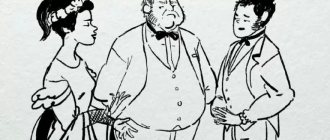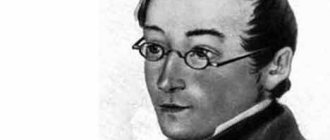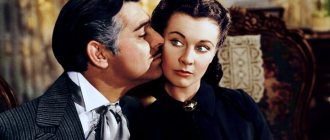Summary
The main idea of Griboedov's work is to ridicule the lifestyle of the nobility of the 19th century. Characters:
- Pavel Famusov is a nobleman who considers rank and wealth to be the main things in life;
- Sophia is his daughter;
- Lisa - serf maid;
- Molchalin - Famusov's secretary, Sophia's lover;
- Skalozub - colonel, potential groom of Famusov's daughter;
- Chatsky is the girl’s childhood friend, a representative of the new generation.
The comedy begins with Lisa appearing in Sophia's room. The girl spent the night with her lover, her father’s secretary Molchalin. Pavel Famusov flirts with a maid on the threshold of his daughter’s room, and later runs into an employee. He doesn’t understand what the secretary can do in his house so early.
Lisa reminds Sophia of her past lover, Chatsky, who is now traveling. But the young lady considers him only a friend. Unexpectedly, a young man appears in the Famusovs’ house. He speaks unflatteringly about the secretary and asks about his acquaintances, whose lives seem funny to him. Sophia is offended by this conversation. Chatsky leaves for his home, but returns in the afternoon.
In the evening, the Moscow aristocratic society gathers at the Famusovs'. Among them are Colonel Skalozub, the imperious old woman Khlestova, Zagoretsky, Prince Tugoukhovsky, and the Gorichi spouses. Chatsky continues to talk about some of them in a sarcastic tone, which irritates Sophia. The girl tells one of the guests that the young man is out of his mind. This news quickly spreads among the company and is surrounded by speculation and ridiculous rumors.
Later, another nobleman, Repetilov, appears; he invites Chatsky to join the “union of determined people,” but he refuses, because he knows the character of his friend. Everyone tells the newcomer that his friend has long lost his mind. Chatsky hears all this and worries about whether Sophia knows about the gossip. At this time, Molchalin admits to Lisa that he is courting the young lady only for the sake of strengthening his position. In fact, he has long been in love with a serf. Sophia hears this dialogue and demands that the secretary immediately leave his position and her father's house.
Chatsky accuses the girl of her deceit and inventing fables; all the guests and Famusov came running to the noise. Having learned the truth, he threatens to send his daughter to her aunt, and send the maid to work as a poultry worker. The young traveler laughs at his own short-sightedness and the ideals of Famus society, in which it is difficult for him to maintain his sanity. And the owner of the house is only concerned with what the princess will say.
The era of Chatsky
The play was completed by the author in 1824. But he began working on it sometime between 1816–1821. (the exact date has not been established by researchers). What time was it?
The Patriotic War of 1812 ended victoriously. It was expected that the heroism of the people would be encouraged by the abolition of serfdom, but this did not happen. The first signs of growing dissatisfaction with the internal policies of the state appeared. In 1816, the first secret organization of future Decembrists, the Union of Salvation, was created, and its creation was the first step towards limiting the authoritarian power of the absolute monarchy in Russia. In 1818, at the European Diet there was a demand to limit autocracy, introducing it into the framework of the law and constitution, but Emperor Alexander I, who was present at it, was terribly afraid of the penetration of the “French infection” into the country, that is, revolutionary ideas. At the European Diet he supported these demands, but did not implement them in the country.
In the comedy "Woe from Wit" only Chatsky talks about new morality, new ideas and aspirations for spiritual and political freedom. It is he who carries the “spirit of the times”. But during his three-year absence in Russia, the joy over the victory over Napoleon subsided; the prose of life with its pressing problems captured society. In Moscow, life returned to normal, and only the returning Chatsky still did not part with the illusions of imminent changes. At that time, progressive people did not strive for revolutionary changes, to overthrow the monarchy, etc. They dreamed of fulfilling their duty to the Fatherland, which consisted of honest service to it. Therefore, Chatsky went to St. Petersburg, but soon realized that the state does not need honest patriots, it needs service: “I would be glad to serve, but it’s sickening to be served.” And he returns to Moscow. But here he meets even more zealous opponents of any transformations - the “Famus society.”
So, Chatsky’s era was distinguished by irreconcilable hostility between the defenders of the old worldview and representatives of the new thinking.
Famusov's image
Pavel Afanasyevich Famusov is the main defender of the old order. He has an influential rank, wealth, and a good position in society. All the action of the comedy takes place in his house. His image personifies all the features of the nobles of the 19th century.
The values of the aristocrats of that time:
- money;
- achievements in service;
- useful acquaintances and connections.
Personal qualities don't matter. Famusov says to his daughter: “Whoever is poor is not a match for you” (quote from the work). Like all Moscow aristocrats, he wants to get a rich son-in-law. Even the character of a potential groom is not important to him; it is enough for a young man to have two thousand souls under his command.
Famusov's life is scheduled by the hour, while he spends every day in idleness. His calendar only shows christenings, wakes and dinner parties. And he treats his service lightly: he does not read the documents he signs, he does not understand accounting calculations and tables.
The comedy also condemns the habit of the nobility to hire only relatives and acquaintances. The education and level of enlightenment of a person is not important, the position will still be occupied by “the children of a sister-in-law or sister-in-law.” It is the owner of the house who has all the traits that unite representatives of Famus society. This is contempt for the poor and humble, the habit of bowing to the rich and powerful, ridicule of education and moral values.
Chatsky's conflict with Famusov society
A free-thinking person, a liberal and a freethinker, “preaching freedom,” Chatsky cannot be understood in Famus society. Famusov calls him a “Carbonari”, “Jacobin”, “dangerous man”. Chatsky’s views frighten the conservative Famusov: “He wants to preach freedom!..”, “He doesn’t recognize the authorities!..”, etc.
On the path of the transformations that Chatsky dreams of, this Famus world stands like a dense wall with the predominance of those morals against which he rebels with all his soul. These include: helpfulness, sycophancy, nepotism, pursuit of ranks, bribery, family ties when obtaining a position, etc. But the hero, who has been absent for three years, does not understand that during this time a new type of people has appeared - Molchalin and others like him. Chatsky sees only his insignificance so far and does not perceive a person of this type as a danger to society, although he really exists.
Molchalin is not only Chatsky’s happy rival, but also an immoral, unprincipled, cunning, resourceful person. He is completely opposed to the ideas and ideals of Chatsky, is prudently gaining strength and will not tolerate people like Chatsky on his path in the future. Subsequently, the writer M. Saltykov-Shchedrin pointed out that the silent people who had taken root in Russian life would become the most terrible figures in Russian life.
So, Chatsky does not serve anywhere, because he does not want to “serve” and bend in front of his superiors. And without this it is difficult to make a career. But he believes that you can find yourself in creativity or science. His passion, ardor and sensitivity are evidence of his creative nature and artistic taste. He has his own opinion about everything and does not read stupid books that are popular in society: “I’m not a reader of nonsense, //But more than exemplary ones...”
He is outraged that the Russian nobility is adopting everything foreign and that among the nobility only foreign fashion trends are accepted: “Will we ever be resurrected from the foreign power of fashion?”
The Chinese, in his opinion, act wisely when they do not get carried away with everything foreign: “Ah! if we were born to adopt everything, //At least we could borrow a little from the Chinese //They have a wise ignorance of foreigners.”
The ideal of a nobleman - Skalozub
Colonel Skalozub is a desired son-in-law for Famusov. It is for him that he wants to give Sophia. This is a stupid soldier, but he aims to become a general. For the owner of the house, a man is a source of gold and useful connections. It was thanks to acquaintances that Skalozub achieved his title; he himself did nothing for this.
The colonel supports all his friends and relatives, which makes Famusov very happy. Thanks to his patronage, Skalozub's cousin quickly advanced in his career. But when they wanted to reward him with a high rank, he gave up everything and went to the village, where he began to lead a calm and measured life. Skalozub and Famusov condemned this behavior and could not understand it. After all, for them, their life goals are high ranks and position in society, wealth and useful connections.
The role of Molchalin
In Famusov’s society there are also nobles of lower ranks. Molchalin is one of these. With his servility and patience, he tries to achieve recognition from the older generation. The young man shows an obsequious attitude towards rich aristocrats, he is ready to serve them, he is afraid to even look up again.
At first he seems to be just a silent and modest admirer of Sophia. Later it becomes clear that he does not have sincere feelings for the girl. Molchalin is afraid of manifestations of love on her part, afraid of sharp tongues. He plays the young lady's lover so that her father will treat him condescendingly.
From childhood, his parents instilled in him the need to adore the rich, so he strives to please his superiors, fears a conflict of interests and prefers to remain silent. While a young man does not have a high rank, he depends on others. For this reason, Molchalin tries to please everyone and earn praise.
The meaning of Chatsky's image
The image of Chatsky from the first days of the appearance of “Woe from Wit” caused the most controversy. This is a new type of person in Russian society. And his collision with the world of the famusovs is not a private phenomenon, it is the need for a change in society.
But in the current situation, he is powerless to change anything, hence his irritability and some lack of restraint. Chatsky is the first “superfluous person” both in Russian literature and in Russian society. And his further fate is unpredictable: he will either become a Decembrist and go to Senate Square in 1825, or he will become disillusioned with the “abominations of Russian life” and leave Russia forever, becoming an emigrant.
Characterizing the image of Chatsky can be useful when writing essays and for preparing literature lessons.
Other characters
There are other characters in the comedy who fall under the characteristics of Famus society. These are the comrades of the owner of the house:
- Maxim Petrovich;
- Tatyana Yuryevna;
- Kuzma Petrovich.
The author added off-stage characters so that the morals and behavior of different representatives of the nobility could be compared. Maxim Petrovich is Famusov's uncle. He knows how to flatter his superiors, for which he received a high rank. This quality is of great importance in the eyes of aristocrats. For the sake of entertainment of the imperial court, the man agreed to expose himself to ridicule, which did not bother Famusov. On the contrary, the aristocrat considers this a manifestation of intelligence, because after such behavior the uncle received many subordinates and orders.
The owner of the house remembers the late Kuzma Petrovich. This man was also not afraid to humiliate himself in order to improve his financial situation. His character can be recognized from a brief description: he himself was rich and was married to a rich woman. Another influential person is also mentioned - Tatyana Yuryevna. She occupies a leading position in society, every nobleman wants to make friends with her. All her comrades and relatives are officials and officials , so communication with her is beneficial.
Additional characters helped Griboedov more vividly describe the characters of the aristocrats, show their values, advantages over the poor and special rights.





